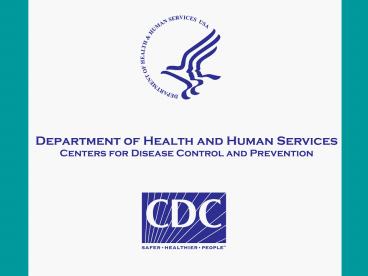Vision Care in Diabetes Prevention and Control Programs - PowerPoint PPT Presentation
1 / 27
Title:
Vision Care in Diabetes Prevention and Control Programs
Description:
The findings and conclusions in this report are those of the authors and do not ... 12,000-24,000 people lose their eyesight from diabetes each year ... – PowerPoint PPT presentation
Number of Views:74
Avg rating:3.0/5.0
Title: Vision Care in Diabetes Prevention and Control Programs
1
(No Transcript)
2
Vision Health and State Diabetes Prevention and
Control Programs ? Are DPCPs Making A
Difference?
- Magon M. Saunders, MS, RD, LD
3
Disclaimer
- The findings and conclusions in this report are
those of the authors and do not necessarily
represent the official position of the Centers
for Disease Control and Prevention.
4
Objectives
- Describe state diabetes prevention and control
programs (DPCPs) efforts to increase the rates
of dilated eye exams and to improve vision health
across the states - Discuss the policy and advocacy implications of
these efforts and what other DPCPs could benefit
from getting involved in vision health programs
and services
5
Background
- 12,000-24,000 people lose their eyesight from
diabetes each year - The rate of dilated eye exams among people with
diabetes in the U.S. varies from state to state
(50-60 BRFSS NHIS,2002) - CDC funds 59 DPCPs to implement diabetes
prevention and control activities at the systems
level - Many DPCPs use a variety of strategies to address
vision/eye health in their respective states
6
24 million with Diabetes
57 millionwith Prediabetes
7
Diabetes
The leading cause of new cases of end stage renal
disease
A 2- to 4-fold increase in cardio-vascular
mortality
The leading cause of new cases of blindness in
working-aged adults
The leading cause of nontraumatic lower extremity
amputations
8
CDCs National Diabetes Program Objectives
- Increase the proportion of persons with diabetes
who receive - Annual foot exams
- Annual dilated eye exams
- Annual flu vaccination
- At least one A1C test per year
9
National Diabetes Framework
- 4 Goals
- Prevent diabetes
- Prevent complications, disabilities, and the
burden associated with diabetes - Eliminate diabetes-related health disparities
- Maximize the organizational capacity to achieve
the NDF Goals
10
Key Initiatives Supporting the National Diabetes
Framework
- Surveillance
- Collaborate with State DPCPs
- National Diabetes Education Program (NDEP)
- Native Diabetes Wellness Program (NDWP)
- Vision Health Initiative
11
What is MIS?
- The Division of Diabetes Management Information
System (DDT MIS) is a Web based system designed
to facilitate the collection and sharing of
programmatic information between state-based
diabetes prevention and control programs and the
CDC staff through a common Internet interface.
12
The MIS Up Close
- DDT MIS generates reports, supports queries,
standardizes reporting practices, consolidates
program information, and fosters continuity and
consistency throughout the diabetes community. - MIS consists of four modules
- The Cooperative Agreement (CA) module
- The Evaluation Tool Kit (ETK)
- The Diabetes Indicators and Data sources Internet
Tool (DIDIT), - Reporting Module which allows the generation of a
myriad of descriptive reports using the
information entered by DPCPs in the Cooperative
Agreements Module.
13
The Evolution of State DPCPs
14
Essential Functions of the State DPCPs
Diabetes Surveillance
Workforce Development
Assessment Strategic Planning
Quality Care Improvement
Partnership Development
Technical Assistance
Raising the Profile of Diabetes
15
What DPCPs Are Doing To Address Vision Care
- Health Systems Diabetes Collaborative, Education
Programs, etc. - Health Communications Raising awareness of
diabetes risk factors and preventive care
practices in high risk populations - Community/Policy/Environmental Change Developing
community coalitions, mobilizing partners to
advocate for policy change, etc. - Screenings and Vision Outreach Work in diabetes
retinopathy, providing dilated eye exams, etc.
16
Vision Health Activities among State DPCPs
17
DPCP Vision Initiatives 2003-2008
18
DPCP Vision Initiatives 2003-2008Contd
19
Vision Health Project Examples
- Education - Public and health care providers
including media campaigns - Design vision awareness poster
- Distribute education materials on eye care in
various languages - Surveillance - develop strategy for collecting
baseline vision data and running the vision module
20
Are DPCPs making a difference in Vision Health?
- On average, the dilated eye exam rate had
improved from 58 in 1995 to 64 in 2006 (BRFSS). - Increase in partnerships around vision health
HMOs, Lions Club, NEI, etc. - Capacity building at the state and national level
to address vision needs. - Expansion of services and programs at the systems
level
21
Age-Adjusted Annual Dilated Eye Exam Rate per 100
Adults with Diabetes, U.S.,1994-2005
22
Next Step
- Policy Implications
- -More funding is needed to expand vision
services - -Increase education for decision makers
- -Increase grassroots policy efforts
- -Focus on prevention efforts
- Take home message
- -All DPCPs can get involved at some level
- You choose where
- Reach out to partners and select interventions
based on the FOA - Take it to the next level
23
Yes We Can
- Margaret Meads Quote
- No doubt one group of committed people can
change the world .. Indeed, it is the only thing
that ever has. - Become a Change Agent today.. Join the ranks of
the Committed.
24
Prolonging life span after the onset of diabetes
- a scientific and moral victory
25
QUESTIONS /ANSWERS
- Ready, Set, Go.
26
Contact Information
- Magon Saunders, MS, RD, LD
- Program Consultant
- 770-488-5214
- MSaunders_at_cdc.gov
27
THANK YOU































